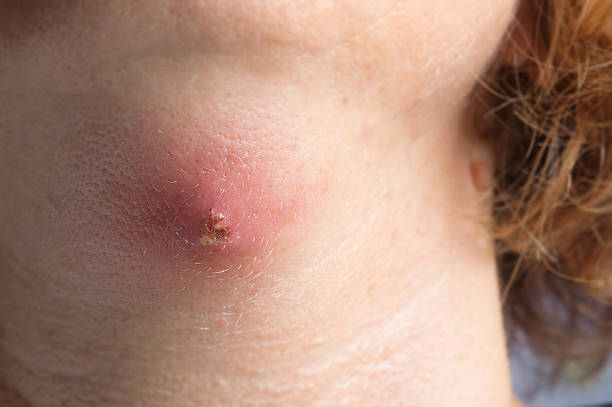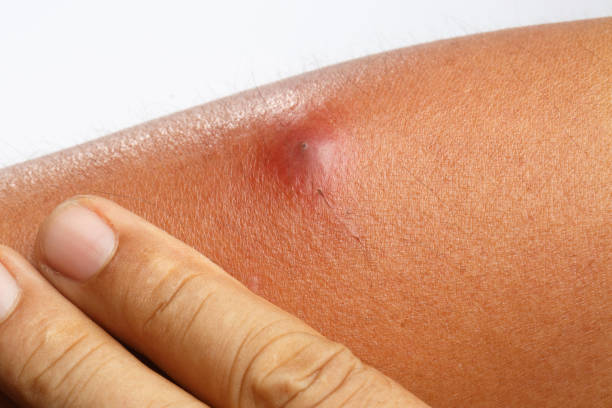An abscess is a localized collection of pus caused by skin infection from a cut or scratch. The pus is typically white or yellow in color and may be accompanied by swelling and redness.(1)
Home remedies are traditional, natural, and effective methods for reducing swelling and relieving abscess-related discomfort sensations such as pain and redness.
Abscesses can appear anywhere on the body, but they are most common in the following areas:(2)

- Right around the anus.
- Hairy areas, particularly the groin and axilla.
- The vertebral column’s base.
- All-around teeth (dental abscess).
- Vagina.
Home remedies for skin abscess

- Use a warm compress for 40 minutes several times per day, especially if the abscess is small, less than 1 cm in diameter.
- Avoid sneezing and pressing on the abscess to drain it to prevent bacteria from spreading to deep healthy tissue.
- Do not attempt to open the abscess with a sharp instrument or needle, as this will aid in the spread of the infection and may injure the underlying blood vessels.
What exactly causes an abscess?
Having known that abscess may occur in any part of the body, here are what really cause these painful sores.
- Inflammation of the body’s or the scalp’s hair follicles.
- Skin abrasions and punctures
- Following surgery.
- Sebaceous and sweat glands that are obstructed.
An abscess on the skin develops as a result of an inflammatory reaction by the immune system to an infectious organism or foreign material.
It forms a cavity to lock up the organism and prevent it from spreading to other areas of the body. The interior of the abscess liquefies, forming pus that contains bacteria, protein, and dead cells.
The most common organism for skin abscess and methicillin-resistant skin abscess is Staphylococcus aureus. Staphylococcus aureus (MRSA) can cause skin abscess (recurrent abscess), but it is less common.(3,4)
Foods with anti inflammatory properties to help curb abscess
- Eat more plant based diet. Visit your health food store and choose foods that are purely made from plants. they have compounds that help reduce inflammation.
- Ensure you get omega-3 in the diet. Incorporate foods like nuts and chia seeds which are rich in omega three to help you reduce inflammation in the body.
- Focus more on antioxidants like berries and kale among other green leafy vegetables to help reduce both inflammation and bacterial infection.
- Use baking soda as a remedy but limit its use in food. You may substitute its effects in making bread by using flax seeds.
- Use cold pressed oils like Olive oil for your cooking. Its also an effective carrier oil but make more use of it in the kitchen.
Common abscess risk factors
All causes of a weakened immune system are considered risk factors for an abscess.(5,6)
- Compromised immune system.
- Cancer
- Diabetes Type 2
- Persistent diseases
- Chemotherapy
- Severe burns
- Serious trauma
- Alcoholism and tobacco use
- Renal failure dialysis
- AIDS and HIV
- Lupus erythematosus type 10
What is the most effective abscess treatment?
Any abscess necessitates drainage; this is a medical rule, so the abscess must be opened and drained by you or with the assistance of your doctor using an incision and drainage procedure. (7,8)
Antibiotics are extremely beneficial in the treatment of abscesses; however, antibiotics alone are insufficient to relieve the abscess.
Prevention of abscess formation
- Personal hygiene is critical in preventing bacteria from invading the skin and causing skin infections and abscesses. Wash your hands frequently and avoid sharing your toothbrush and other personal tools.
- Avoid coming into contact with infected people or using their equipment.
- A nutritious diet
- Regular exercise to keep your body healthy and disease-free to avoid immune system weakness.
- To prevent the spread of infection, properly dispose infected tissues and dressings.
- Good oral hygiene and a 6-month dental check-up can help reduce the risk of dental tooth abscess.
Reoccurring abscess
A recurrent abscess is when a person has two or more episodes of abscess formation within a year.
A recurrent abscess is a collection of pus that returns to the same location. This can happen in the lungs, the brain, the liver, the kidneys, and other organs and tissues.
A recurrent abscess differs from a chronic abscess (such as tuberculosis) in that it develops soon after treatment or improves after treatment.
An abscess is a walled-off collection of fluid outside the bloodstream that usually contains dead cells and cellular debris.
Recurrent abscess develops as a result of immune system deficiency caused by: Leukemia, Tuberculosis , HIV and Malignancy
When to see a doctor for abscess
There are times when the pain is unbearable and you need quick relief. In this instance you may call your dentist while resting your head on a wedged pillow to calm your positional pain.
Although it will only bring temporary relief from tooth pain. You can try some abscess home remedies first, but you should see a doctor immediately if:
- A large abscess measuring more than 1cm in diameter.
- Extremely painful.
- Experiencing fever.
- Abscess in the area of the rectal and groin.
- Numerous and recurring abscesses
- The infection has spread.
In the case of a tooth abscess, you may experience facial swelling and difficulty swallowing.
Wrap up
In this article are various natural remedies for dental care at home. Several of them have sufficient scientific evidence to their ability of helping you secure both temporary relief and long time cure.
They will save you time and resources for your important plans other than dental insurance, and booking dental appointment.
Because prevention is better than cure, try to avoid the bacteria’s invasion into your body as much as possible.
If the symptoms persist then seek medical attention if the abscess persists for an extended period of time.

